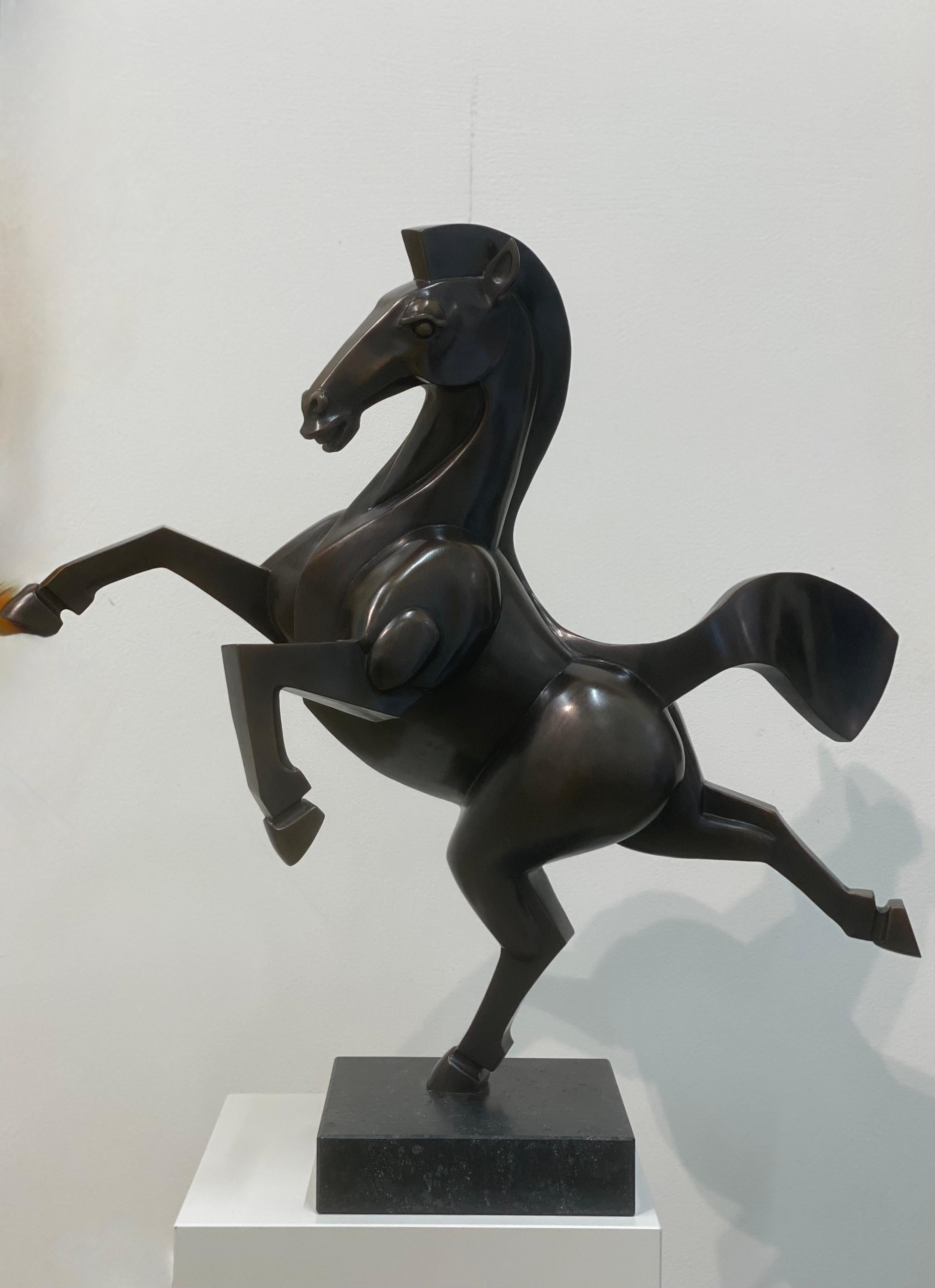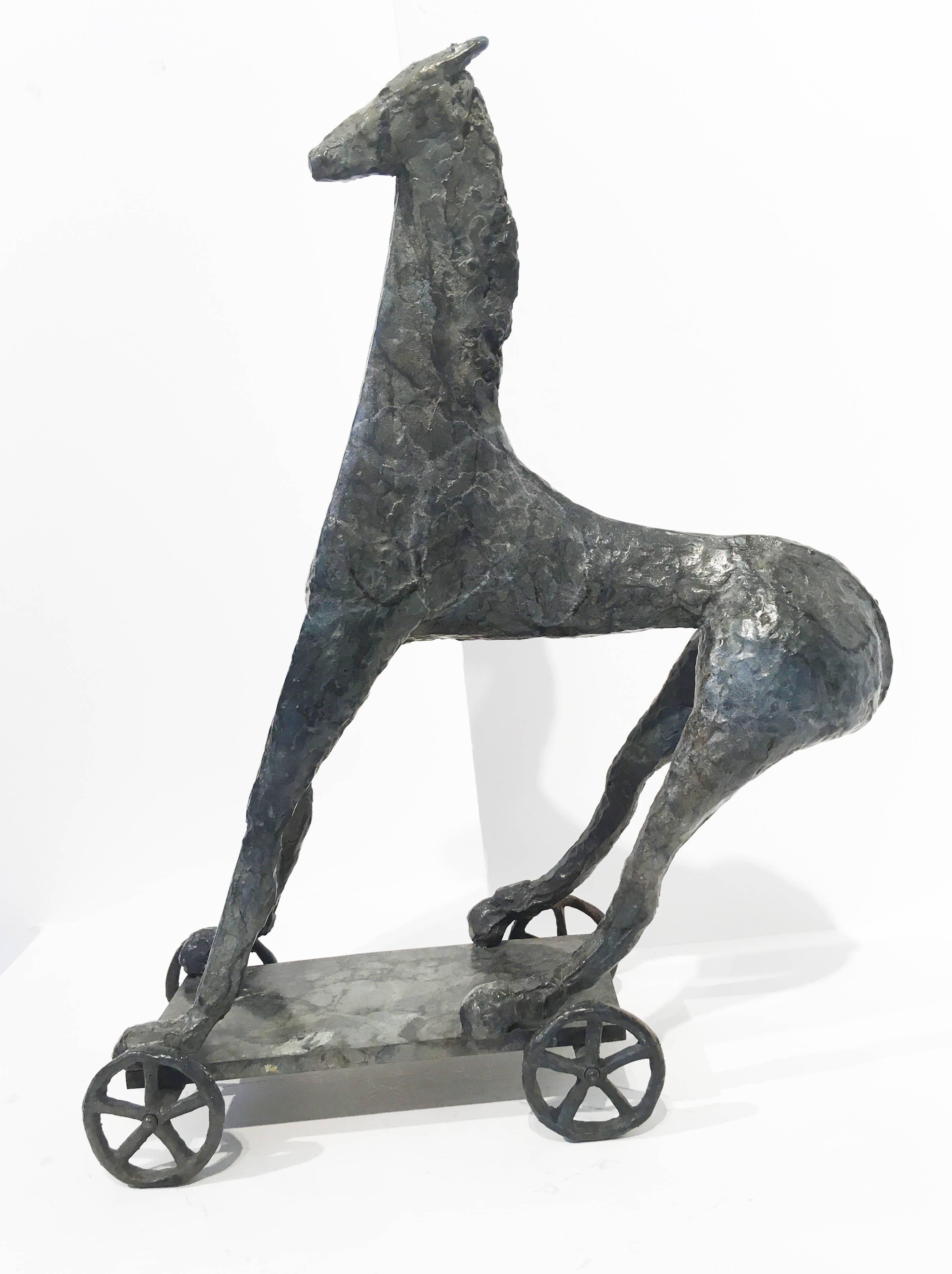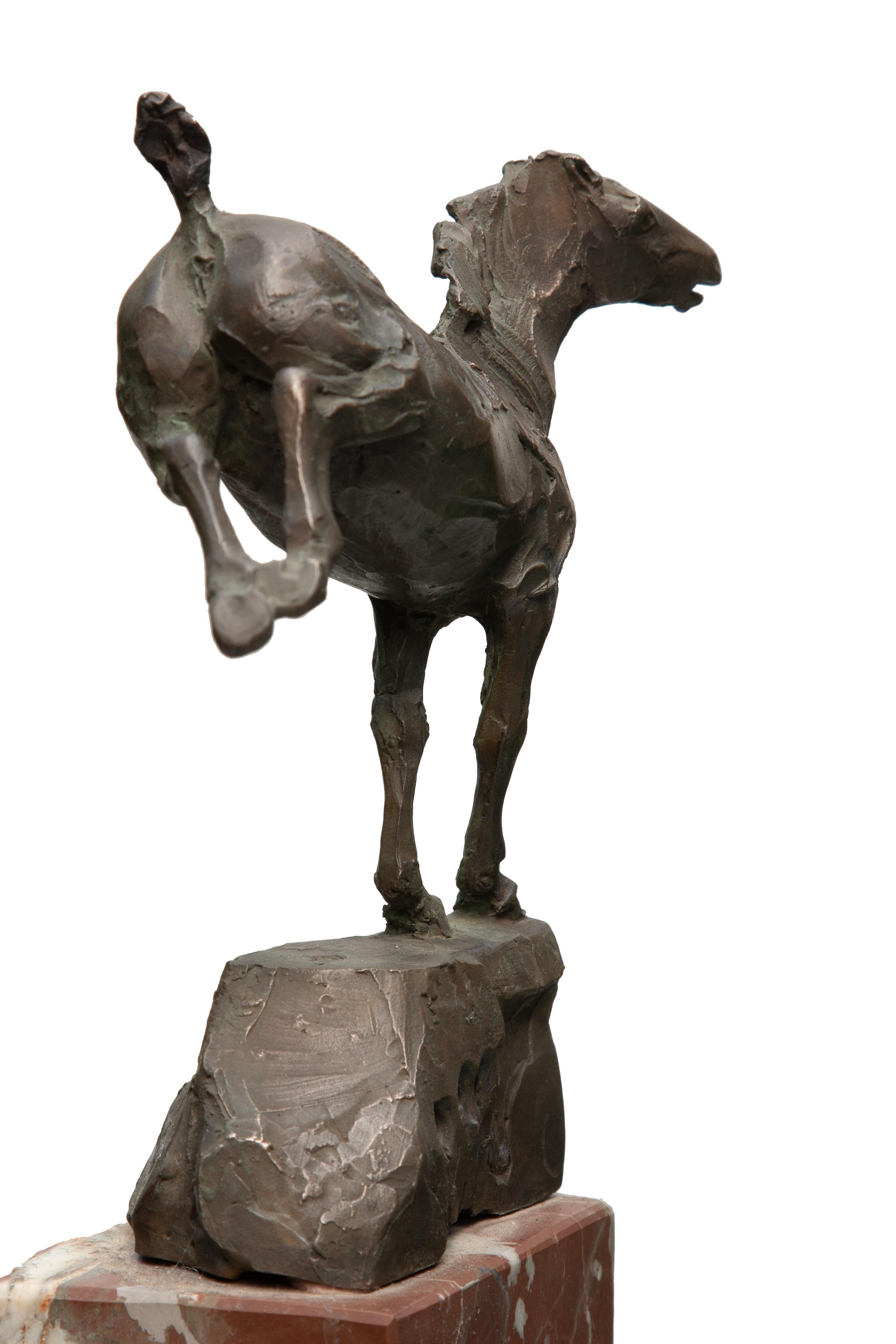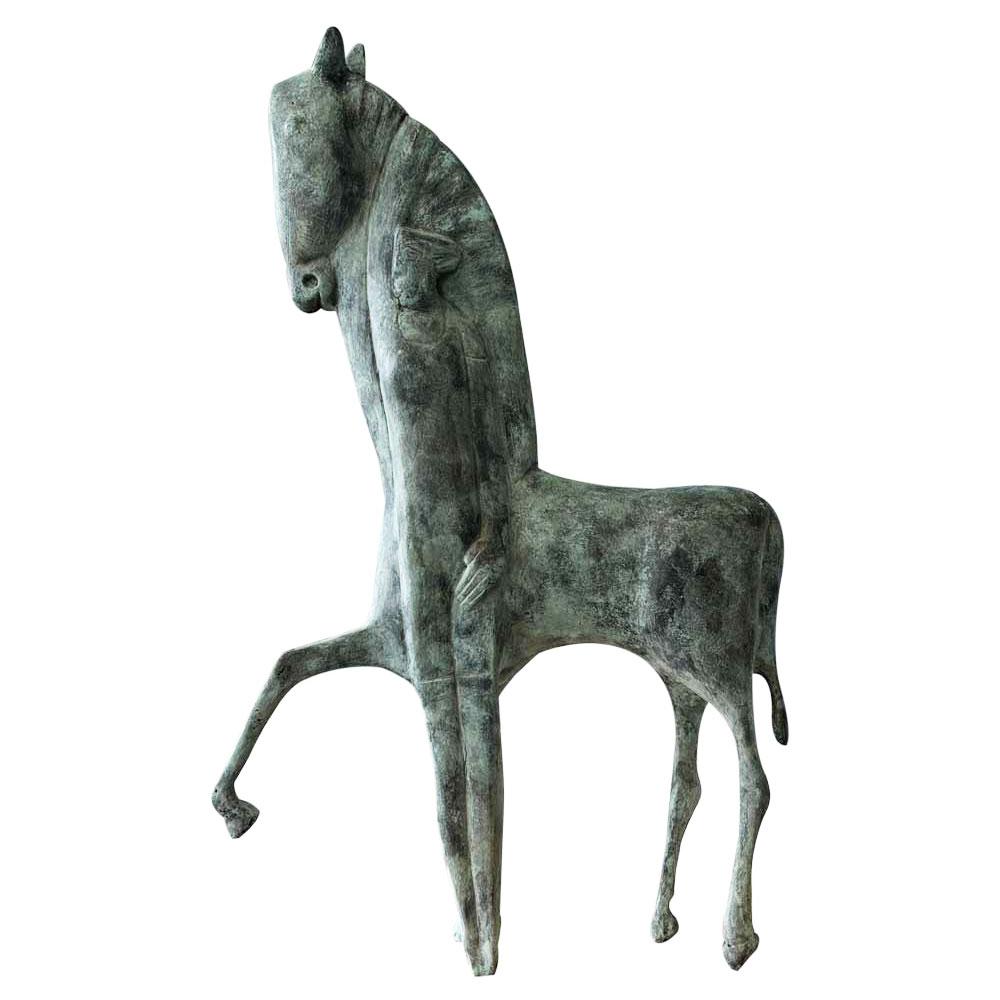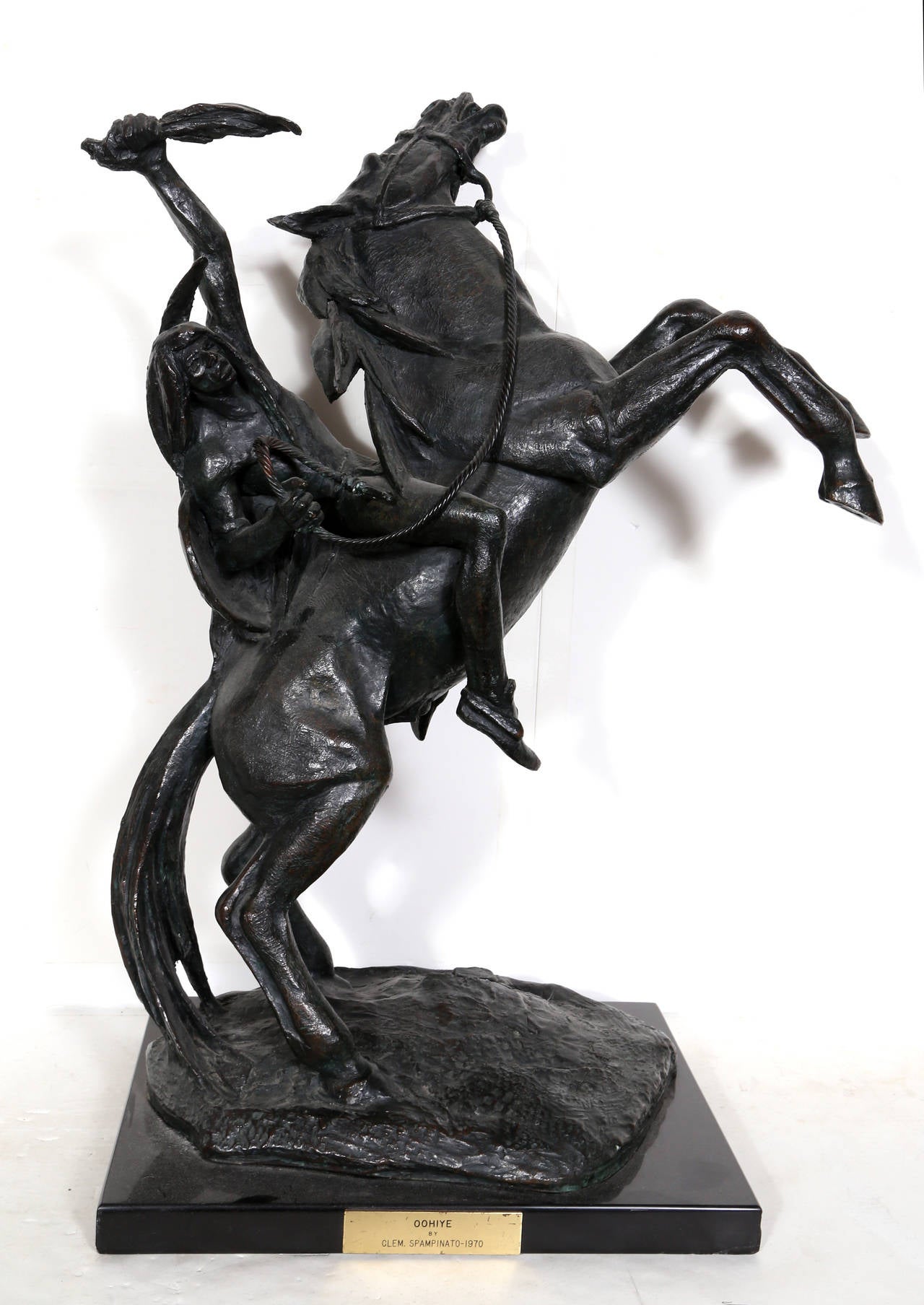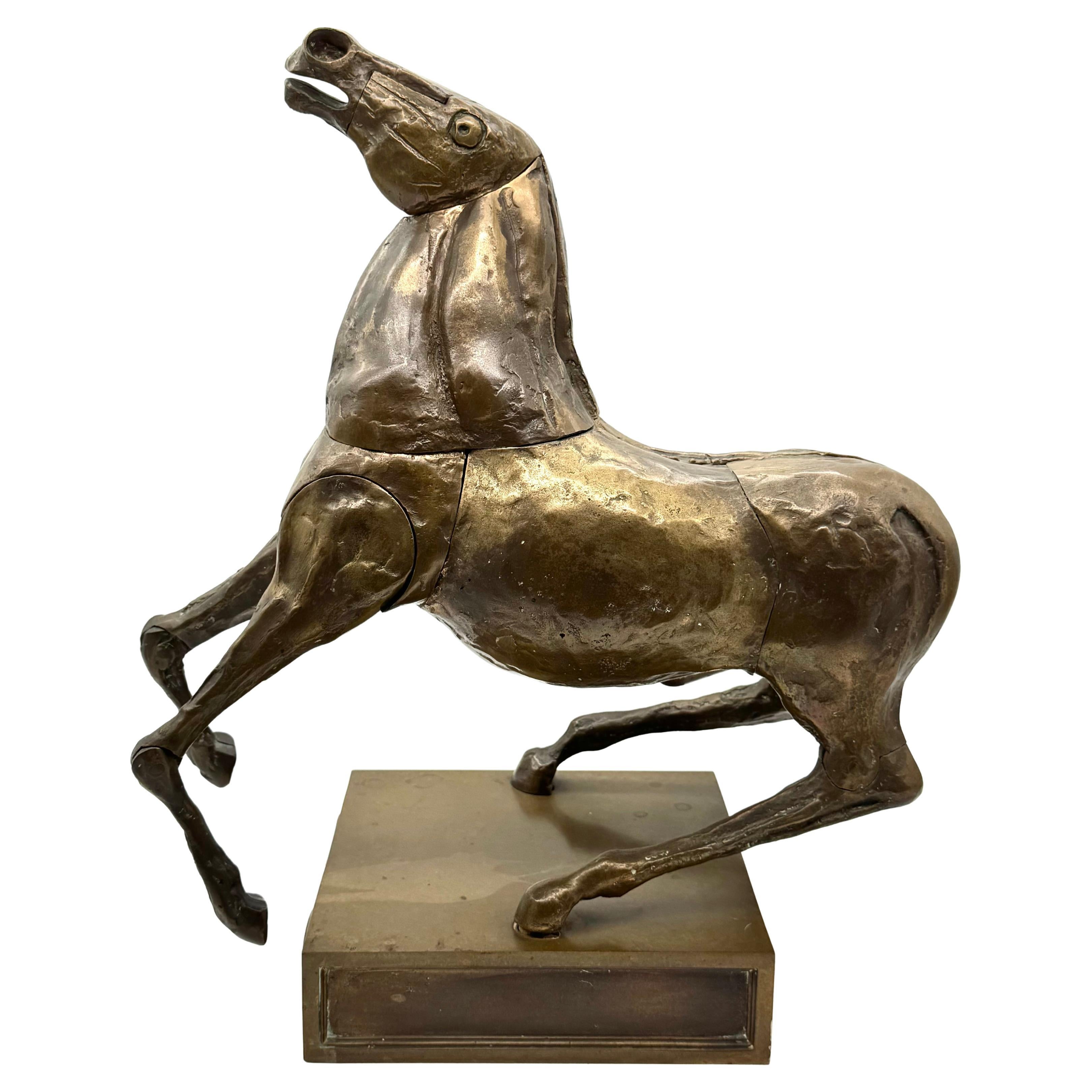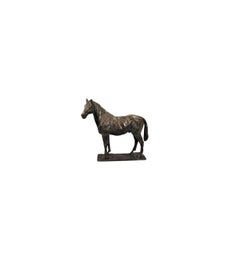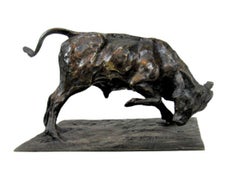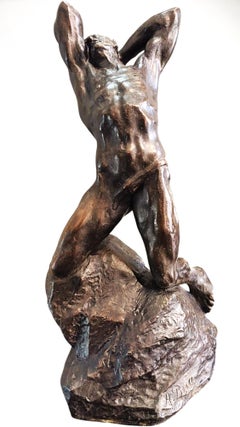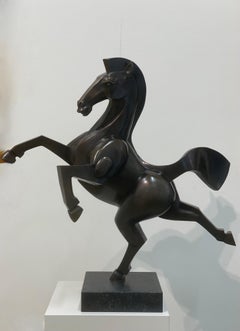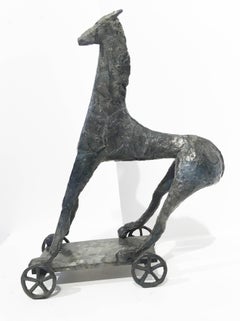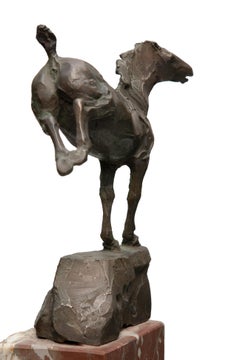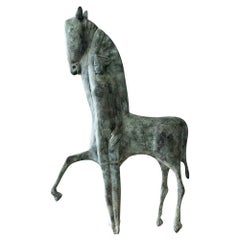Items Similar to Bucephalus – Bronze Sculpture by Manolis Tzobanakis
Want more images or videos?
Request additional images or videos from the seller
1 of 10
Manolis TzobanakisBucephalus – Bronze Sculpture by Manolis Tzobanakis20th century
20th century
$21,737.30
£16,592.10
€18,500
CA$30,655.36
A$33,680.36
CHF 17,601.56
MX$401,666.22
NOK 222,883.43
SEK 207,634.71
DKK 141,005.53
About the Item
In Bucephalus (1973), also known as Alexander, the King of Macedonia, Manolis Tzobanakis crystallizes the explosive encounter between ancient myth and modern form into a single, compact bronze gesture. Although the sculpture stands only forty centimeters high, its presence is anything but diminutive. It radiates monumentality through form, force, and abstraction. In this early masterpiece, the Cretan sculptor offers not a literal figuration of Alexander the Great taming his mythic steed, but a radical interpretation of the episode—one that splinters classical clarity into a Cubist-Futurist whirlwind of movement and tension.
SIgned
Edition II/VI
From every angle, the sculpture reveals a startling interplay of mass and void, of sharp thrusts and interlocking surfaces. The horse’s body—its hind legs flung mid-air in a powerful rear, its muscular shoulders bucking forward—is rendered in faceted bronze planes, the musculature abstracted into a storm of geometric volumes. These volumes seem simultaneously to expand and collapse, capturing the animal's resistance in a single frozen instant. The rider, Alexander, is not modeled in anatomical realism; rather, he emerges from the dynamism of form itself: a sweeping arc for the arm, a twisting torque of the torso, a forward-driving stance conveyed not through realism but through rhythm.
The execution is both refined and raw. Tzobanakis leaves expressive tool marks across the bronze’s surface, allowing light to fracture along its ridges and catch in its crevices. There is no attempt at polished finish; instead, the work embraces a primal tactility—one that evokes both the heat of the foundry and the mythic heat of battle. The patina is a darkened bronze, shifting between ochre and burnt umber, suggesting age and gravitas, like a fragment excavated from a modern Troy.
The composition unfolds centrifugally: movement radiates outward from the sculpture’s core, coiling in the rider’s stance and bursting forth in the rearing horse’s limbs. The balance is precarious, yet assured—anchored by the rider’s forward step and the weight of the black marble base. The circular sweep of Alexander’s upraised arm forms a visual echo of the horse’s arched back, fusing the two figures into a single, integrated force.
In terms of lineage, Bucephalus bears witness to Tzobanakis’s study of Italian modernism during his formative years in Florence and Rome. Echoes of Umberto Boccioni’s Unique Forms of Continuity in Space resonate here, particularly in the treatment of velocity and fluid geometry. Yet the influence is digested, transformed. Where Boccioni pursued futurist exaltation of speed and technology, Tzobanakis roots his abstraction in psychological and political meaning.
Indeed, created in the shadow of the 1973 Athens Polytechnic uprising against the military junta, Bucephalus is not merely an academic homage to a Macedonian hero. It is an allegory of resistance. In this reading, the wild horse represents chaos, violence, authoritarian force—while Alexander, the only one able to tame it, becomes a cipher for the Greek people, the spirit of liberty and unrelenting agency. The sculpture is thus not only a meditation on heroic control over nature, but also a sculptural manifesto of democratic will triumphing over brute power.
The work forms part of a broader sculptural cycle executed between 1972 and 1979, in which Tzobanakis explored the dynamic of horse and rider as an archetypal duality—control and rebellion, harmony and rupture. These compositions, of which Bucephalus is arguably the keystone, helped establish his reputation on the European stage and likely contributed to his Gold Medal at the 1979 Biennale del Bronzetto in Ravenna.
Now held in the National Glyptotheque in Athens (inv. no. Π.4446), Bucephalus occupies a central position in the artist’s early oeuvre. It announces not only a mature sculptural voice emerging from the ruins of classicism, but also the advent of a deeply political, poetic, and formally daring vision that would shape Greek sculpture for decades to come.
- Creator:Manolis Tzobanakis
- Creation Year:20th century
- Dimensions:Height: 5.12 in (13 cm)Width: 13.78 in (35 cm)Depth: 15.75 in (40 cm)
- Medium:
- Movement & Style:
- Period:
- Condition:
- Gallery Location:Gent, BE
- Reference Number:1stDibs: LU2140216137562
About the Seller
5.0
Vetted Professional Seller
Every seller passes strict standards for authenticity and reliability
Established in 2018
1stDibs seller since 2022
6 sales on 1stDibs
Typical response time: 6 hours
- ShippingRetrieving quote...Shipping from: Gent, Belgium
- Return Policy
More From This Seller
View Allbronze horse statue by Patrick Villas
By Patrick Villas
Located in Gent, VOV
Standing horse sculpture in bronze 2001.
The first cast of a proud standing horse, looking to the side. A fine bronze statue by Patrick Villas (°1961), in his typical expressionist ...
Category
21st Century and Contemporary Expressionist Figurative Sculptures
Materials
Bronze
Young Bull Fighting – Bronze Sculpture by Guido Righetti (c. 1926)
Located in Gent, VOV
Guido The bronze patina, a rich dark brown with subtle reddish and golden undertones, enhances the sculpture’s texture and depth, accentuating the anatomy of the animal and evoking t...
Category
20th Century Modern Figurative Sculptures
Materials
Bronze
Vimar Auguste (1851-1916)+bronze, Bohemian horse and monkeys
Located in Gent, VOV
Bohemian horse and monkeys
As early as 1900, Vimar started to create sculptures. His reputation as an illustrator and painter was at its peak.His sculp...
Category
Late 19th Century Naturalistic Figurative Sculptures
Materials
Bronze
Extreme Effort - Powerful Bronze Sculpture by Alfredo Pina (1883-1966)
Located in Gent, VOV
Alfredo Pina’s Extreme Effort (Le Suprême Effort) is a striking bronze sculpture that embodies the raw struggle of human perseverance. This expressive work portrays a muscular male f...
Category
Early 20th Century Modern Nude Sculptures
Materials
Bronze
Mare - hunting horse by Josuë Dupon 1864-1935
Located in Gent, VOV
A beautiful large bronze sculpture of a proud standing mare. Old sand cast created during the artist Josuë Dupon's lifetime.
Josuë Dupon (also Josué or Josue Dupon) was a Flemish sculptor and engraver. His work also includes painting and graphics.
He received his training through evening classes at the academy of Roeselare and Antwerp (1884) and later at the National Institute of Fine Arts (1887). In 1891, he won a gold medal with the monumental sculpture group Samson kills the lion and was runner-up in the Prix de Rome for sculpture. From that year on, his work appeared regularly in exhibitions at home and abroad. His reputation was such, that he became one of a select group of sculptors allowed by King Leopold II to carve statues in Ivory, which was imported from the Congo, the Belgian colony. In 1893 his exceptionally refined ivory statue of Diana was bought by the Antwerp Royal Museum of Fine Arts, which also acquired his spectacular bronze Vulture defending its prey a year later.
Working in every genre and mastering every technique and material, Josuë Dupon became best known as a sculptor of exotic animals. He was equally capable of faithfully expressing anatomical detail as of rendering the animals' nature. Josuë Dupon was a technically faultless realist, with a sense of the dramatic, a feeling for decorative complexity and a tendency towards idealizing. The placement of his camel driver and two bronze groups at the entrance to Antwerp Zoo confirmed this reputation as animalier.
The career that Dupon subsequently built, brought him numerous important awards and an appointment as professor at the Antwerp Academy, a tenure he held between 1905 and 1934. Besides animals, he sculpted busts, war memorials and public monuments. For one of the largest sculptural monuments and the largest fountain in the city of Buenos Aires, called Monument of the Two Congresses, he collaborated with his good friend, the Belgian sculptor Jules Lagae. Josuë Dupon created several statues of mighty condors for this monument.
At the start of his career his conception of art was strongly influenced by traditional 19th century artistic ideals. After the turn of the century his compositions and surface treatment changed and became more modern. He met Rembrandt Bugatti around 1905 or 1906 in the 'Jardin des Plantes' in Paris and invited him to Antwerp. Bugatti began travelling to Antwerp in 1906 to observe and sculpt the inhabitants of its zoo, which was then considered the best in the world, and Dupon allowed Bugatti to stay with him during several of his early visits. As such Dupon became a friend and a bit of a father figure to Rembrandt Bugatti.
Dupon did not play a very active part in artistic movements or associations. Dupon remains an important sculptor not only through his body of work but also because of the influence he exercised through interactions and collaboration with other sculptors such as Lagae, Bugatti and Bourdelle but also because he trained leading sculptors such as Albéric Collin (1886-1962), Willy Kreitz...
Category
19th Century Figurative Sculptures
Materials
Bronze
P.J. Mene 1846, Bronze cast+ Djinn, Arabian Stallion
Located in Gent, VOV
Djinn, Arabian stallion 1846
A French bronze horse with a dark patina with brown undertones entitled 'Djinn étalon arabe' cast from the model by Pierre-Jules Mène (1810-1879), secon...
Category
Mid-19th Century French School Figurative Sculptures
Materials
Bronze
You May Also Like
Wild Horse - 21st Century Contemporary Bronze Sculpture of a Horse
By Frans van Straaten
Located in Nuenen, Noord Brabant
Frans van Straaten
Wilde Horse VII
Bronze on bluestone pedestal
H 65 cm W 65 cm D 35 cm
Dutch artist Frans van Straaten (1963) should be called an artist of balance always searching for harmony between force and movement in combination with space. Because of the wide range in his art-education he has mastered the art of drawing, painting and sculpting technology. However, the classical plastic art of sculpture and modelling opens up the possibility for him to create his own language of sculpture in answer to his urge for art. Due to this style of sculpting, the preference for bronze is natural.
After his study of sculpture at the Academy of Art in Rotterdam (1988), Frans van Straaten creates bronze sculptures in which he unites force and movement. Feeling and Emotion converted into Matter Sculpture is an experience of space combined with the challenge of the three-dimensional. The tension of space and movement are the themes, which Frans expresses in his sculptures. Summary it can be said that the power of life and being, the feeling and emotion by force and movement will be converted into matter. The experience of space is being expressed in the shapes and characters in each of Frans’ sculptures. His sculptures of bulls express explosive power while the horses find their strength in being elegant. Each sculpture recalls this way their own association and serves as a metaphor for a certain emotion. Feelings, which has inspired the artist for each sculpture.
Powerful and Elegant Looking at the works of this artist, it becomes very clear that one of his most important sources is his background in art history. The Renaissance period as well as several Italian artists served as inspiration to Frans as a sculpture. For instance the expressions in Leonardo da Vinci’s artworks, and also Giovanni...
Category
2010s Contemporary Figurative Sculptures
Materials
Bronze
Greek Default -contemporary figurative horse bronze sculpture
By Sara Ingleby-Mackenzie
Located in London, GB
Working in a variety of scales and mainly to commission, Sara's work captures the spirit and form of people and animals. Many of them are inspired by mythology, nature or circus.
Category
2010s Contemporary Figurative Sculptures
Materials
Bronze
Solo Horse Sculpture Bronze Jumping Animal In Stock
By Lucie Sentjens
Located in Utrecht, NL
Solo Horse Sculpture Bronze Jumping Animal In Stock
Lucie Sentjens (Brussels, 1959) is a sculptor, graduated from the Cambre in 1982 in the studio of Rik Poot.
She takes evening pa...
Category
21st Century and Contemporary Contemporary Figurative Sculptures
Materials
Bronze
Horse and Woman Bronze Sculpture Animal Lady
By Theo Mackaay
Located in Utrecht, NL
Horse and Woman Bronze Sculpture Animal Lady
Theo Mackaay (1950)
Mackaay works with recognizable shape:: women, men and animals, with a pointer at the primal form. Archetypal motiv...
Category
21st Century and Contemporary Contemporary Figurative Sculptures
Materials
Bronze
Oohiye, Bronze Sculpture by Clemente Spampinato
By Clemente Spampinato
Located in Long Island City, NY
A classic relic from the American West, Spampinato's exquisite solid bronze sculpture is beauty, grace and action-packed. Signature inscribed on sculpture and plate stamped on base. ...
Category
1970s Contemporary Figurative Sculptures
Materials
Bronze
Miguel Berrocal & Bruno Cassinari "Horse" Bronze Sculpture, No. 1434/2000
By Miguel Berrocal, Bruno Cassinari
Located in CABA, AR
This is a captivating bronze sculpture of a horse, a collaborative work by the renowned Spanish sculptor Miguel Berrocal (1933-2006) and the esteemed Italian painter and sculptor Bru...
Category
Vintage 1970s Animal Sculptures
Materials
Bronze
More Ways To Browse
Mid Century Abstract Bronze Sculpture
Mid Century Modern Italian Bronze Sculpture
Vintage Torque
Alexander King
Stephen Porter
Steven Corning
Sylvia Jaffe
Takenobu Igarashi
Tamiko Kawata On Sale
Toland Sand Glass
Tommy Zen
Torbjorn Kvasbo
Trude Guermonprez
Untitled Picasso Maquette
Ursula Morley Price
Vaclav Cigler
Victor Rojas
Vintage Avon Bottle
